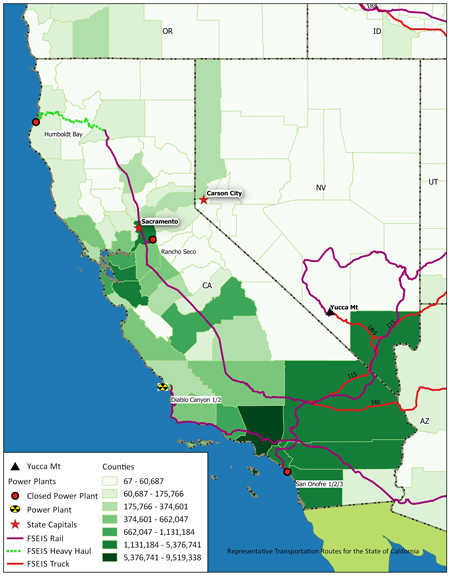New Map shows California Corridors for Extremely Dangerous Radioactive Nuclear Waste Shipments
Some 1600 nuclear waste shipments would cross California, if plans for the country’s first nuclear waste repository in Nevada move forward. The proposed Yucca Mountain Nuclear Waste Repository is about 100 miles northwest of Las Vegas and about 25 miles east of Death Valley National Park. Today, the Nuclear Information and Resource Service released maps of the likely routes radioactive shipments would use, joining dozens of environmental and clean energy groups across the country. The groups want state residents to weigh in with Congress about the dangers.
 According to the map, highly radioactive waste fuel from nuclear power plants would pass through the state on highways and railways, impacting Sacramento, Fresno, Bakersfield, Los Angeles, Orange County, San Bernardino, Riverside, and many other cities, large and small. Each shipment would contain many times more radioactive material than the Hiroshima bomb blast released, with 20 to 50 tons of irradiated fuel assemblies in each canister of 100-150 tons. Department of Energy studies completed in the 1990s confirmed that accidents in transporting the waste to Yucca Mountain would be a certainty, due to the large number of shipments that would be required. The shipments would also be vulnerable to attack or sabotage along the hundreds or thousands of miles that each cask would travel. A lack of proper testing of the casks is another factor in the likelihood and seriousness of accidents. The only required testing involves small scale models and computer simulation.
According to the map, highly radioactive waste fuel from nuclear power plants would pass through the state on highways and railways, impacting Sacramento, Fresno, Bakersfield, Los Angeles, Orange County, San Bernardino, Riverside, and many other cities, large and small. Each shipment would contain many times more radioactive material than the Hiroshima bomb blast released, with 20 to 50 tons of irradiated fuel assemblies in each canister of 100-150 tons. Department of Energy studies completed in the 1990s confirmed that accidents in transporting the waste to Yucca Mountain would be a certainty, due to the large number of shipments that would be required. The shipments would also be vulnerable to attack or sabotage along the hundreds or thousands of miles that each cask would travel. A lack of proper testing of the casks is another factor in the likelihood and seriousness of accidents. The only required testing involves small scale models and computer simulation.“Californians and especially their first responders do not deserve to be subjected to mass transportation of nuclear waste” said Lowell Young of Mariposa, a member of the Nuclear Information and Resource Service. “Even without an incident, radiation escapes from the casks. The incident-free impact zone is a half mile on either side of the route. We have all witnessed horrible oil train derailments and explosions in recent months. An accident involving tons of nuclear waste endangers anyone and anything within a 50 mile radius. According to estimates by the state of Nevada, assuming historical rates hold, 160-390 accidents are expected over the 38 year period of transport to Yucca Mountain. If accidents happen uniformly around the country, then California should expect to experience between 21 and 52 radioactive accidents in the 38 years. And by the way, clean-up is really expensive,” Mr. Young continued.
“Nevada believes the site is not suitable for storing nuclear waste and opposes the project, as does the Western Shoshone Nation. President Obama suspended the licensing proceedings but a court has ordered resumption of the proceedings. Congress should support the people of Nevada and the other 42 impacted states and abandon Yucca Mountain. It is unconscionable to accept the certainty of loss of life and property and permanent damage to natural resources by transporting nuclear waste through or near our cities, farms, forests, rivers, aquifers, and the ocean. In addition, the proposed Yucca Mountain site has unsolved problems regarding safe storage. We need real solutions to nuclear waste, not this half-baked plan for transportation to and storage at Yucca Mountain,” Mr. Young concluded.
A coalition of public interest groups is calling on the Congress and the President to solve these problems that were created by earlier federal legislation. Until a safe, feasible, permanent solution based on sound science and engineering is provided, the waste can most safely be stored where it is now, on site where it was generated, without gravely threatening people's lives and livelihoods, property, and vital natural resources.
Article submitted by Lowell Young








